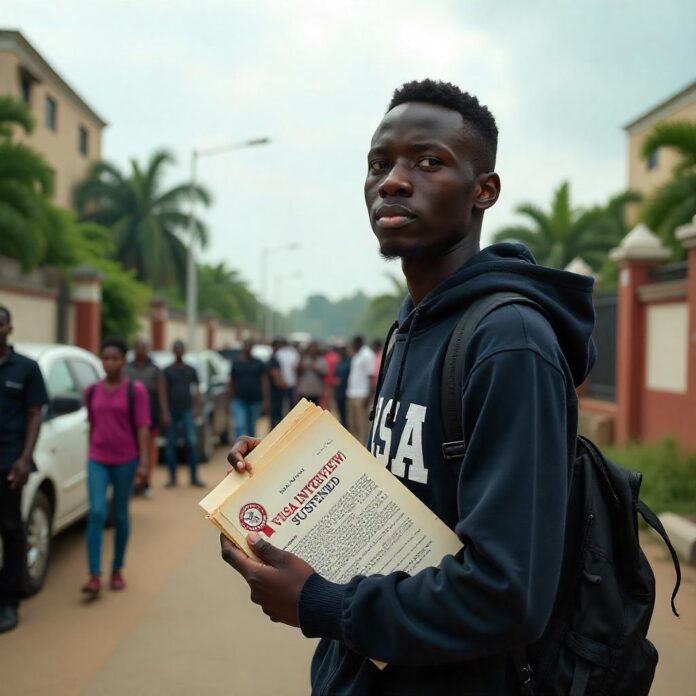Adeola spent three years preparing for her master’s in engineering at Stanford—acing entrance exams, securing funding, dreaming of Silicon Valley. Today, her acceptance letter gathers dust as she stares at a U.S. Embassy notification: “Visa interview suspended until further notice.” Her dream now hangs on policy shifts from Washington she cannot control.
A Sudden Policy Earthquake
The July 8th Shock brought immediate implementation of restrictive U.S. visa rules targeting Nigerian students. Core changes include single-entry visas valid for just three months replacing previous multi-year visas. This forms part of a broader immigration crackdown, including recent travel bans affecting 12 countries, mostly African. Over 13,000 Nigerian students in the U.S.—contributing $514M annually—now face uncertainty, with future applicants confronting daunting barriers.
Decoding the New Visa Landscape
Three-Month Validity
All non-immigrant visas, including F-1 student visas, now carry single-entry restrictions with 90-day validity, requiring reapplication for every re-entry. Previously issued visas remain valid under original terms. U.S. authorities cite reciprocity concerns due to Nigeria’s visa policies for Americans, though Nigeria’s Foreign Ministry claims no new policy triggered these changes. Security benchmarks demand Nigeria improve three areas: secure travel documents, visa overstay management, and information sharing.
Operational Hurdles
Elimination of drop box renewals forces all applicants into mandatory in-person interviews. The two-step Lagos pilgrimage requires two consulate visits: document screening followed by interviews—a costly burden for those outside Lagos. Proposed social media vetting would screen applicants’ Twitter, Instagram, and Facebook history for perceived anti-U.S. sentiment. A May 2025 processing freeze suspended all new student visa interviews indefinitely pending enhanced vetting procedures.
Student Visa Process Changes
Previous processes allowed multi-year validity and drop-box renewals. New 2025 requirements mandate 3-month single-entry visas, compulsory in-person interviews, and two-stage Lagos appointments. Basic background checks have expanded to include proposed social media screening.
Ripple Effects: Academic Dreams Derailed
Visa delays cause students to miss academic deadlines, forcing deferrals or scholarship losses. Reapplication costs exceed $510 plus logistics for each return trip to Nigeria. Short validity deters visiting home during holidays due to re-entry risks. Career limitations emerge as attending global conferences or international internships becomes impossible. Students report severe anxiety and perpetual limbo, particularly those mid-degree.
Behind the Policy: Security, Reciprocity, and Politics
The State Department’s national security narrative emphasizes protecting U.S. immigration integrity and meeting global security benchmarks. This aligns with broader immigration restrictions, including attempted deportations of 7,000 Harvard students blocked by courts in May 2025. The changes threaten $44 billion contributed annually by international students to the U.S. economy. Diplomatic tensions escalate as Nigeria warns travel bans hinder critical mineral and energy trade deals.
Comparative Crackdowns: A Global Trend
Parallel restrictions emerge globally. The UK Home Office profiles Nigerian, Pakistani, and Sri Lankan students as high-risk for asylum claims. Graduate visa cuts reduce post-study work from 2 years to 18 months, disproportionately affecting Nigerians. Alternative destinations gain appeal as Canada, Australia, and Hong Kong actively recruit affected students.
Navigating the Maze: Strategies for Applicants
Pre-Interview Preparation
Audit social media for potential red flags like political posts or humor misinterpreted as threats. Secure detailed financial documentation demonstrating strong home ties to Nigeria.
Logistical Planning
Budget over $2,000 for Lagos housing during multi-week consulate processing. Apply at least six months before program start dates given extended delays.
Contingency Options
Consider deferring admission until policies stabilize. Explore online U.S. coursework options while remaining in Nigeria to maintain academic progress.
Legal Recourse
Monitor lawsuits by NAFSA and ACLU challenging screening policies for potential pathways.
Voices from the Frontlines
Fanta Aw, NAFSA CEO, states: “International students are not a threat… they’re an incredible asset.” An MIT Nigerian graduate questions: “My research in renewable energy benefits U.S. innovation—why punish future students?” An anonymous consular officer admits: “We lack resources to implement social media checks without catastrophic delays.”
Resilience in the Face of Closed Doors
Tightened student visa rules represent more than bureaucratic hurdles—they fracture academic futures and dim cross-cultural exchange. Yet Nigerian students adapt by exploring alternatives, documenting injustices, and building pressure through media. As Adeola considers Canada for her studies, her story underscores a painful truth—the path to global education now demands not just academic excellence, but extraordinary perseverance against shifting political winds.
The American Dream wasn’t dismantled by a single policy, but by a thousand paper cuts to opportunity. Whether this creates a brain drain from U.S. innovation or sparks a renaissance in Nigerian universities remains history’s unfolding verdict.


